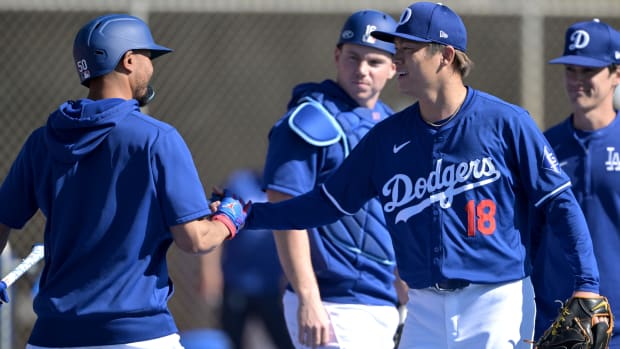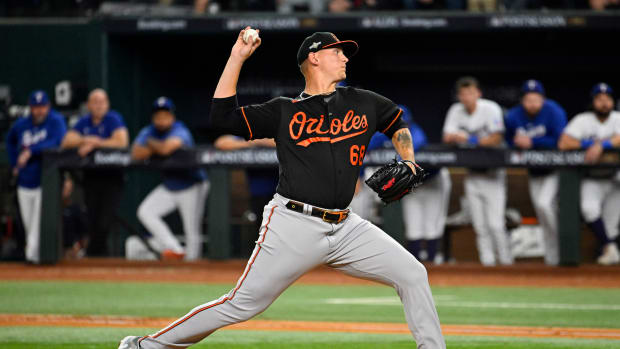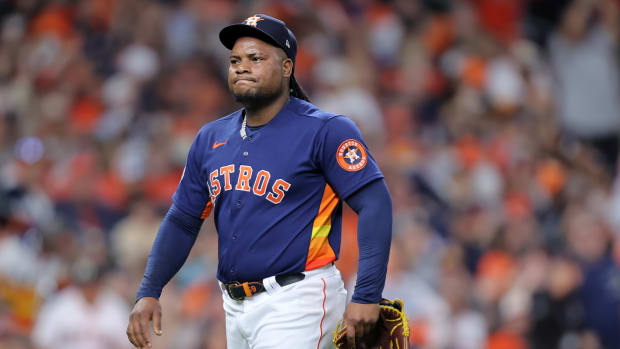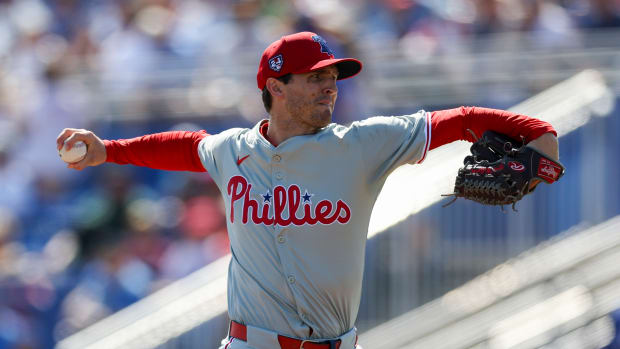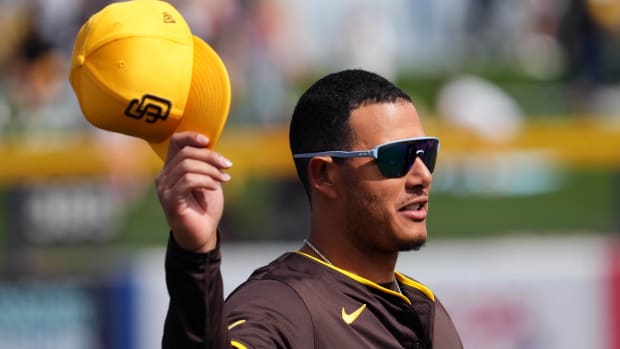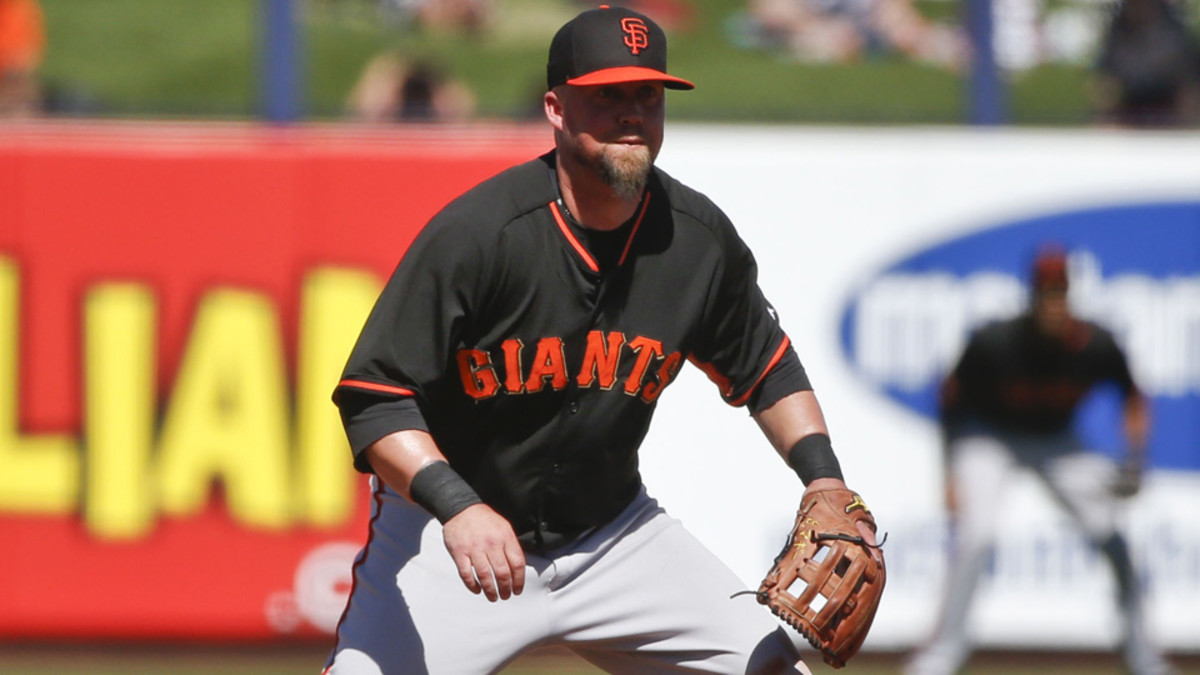
For McGehee, pressure to replace Sandoval on field and for Giants fans
SCOTTSDALE, Ariz.—"You gotta understand, in San Francisco, people are in love with our players," said Giants hitting coach Hensley Meulens on the day before the defending champions' first game this spring. "Whoever they are."
Gordon, Cuddyer, Markakis lead list of bust candidates in NL
A walk around the concourse of Scottsdale Stadium during the past several weeks would support that idea. It's not just that Giants fans wear officially licensed, hologram-stickered jerseys and t-shirts bearing the names of the players who have brought them three titles in five seasons. It's the unofficial stuff—the paraphernalia, either homemade or bought on Etsy or from the shopping carts of street vendors in the shadows of AT&T Park—that confirms the town's passion for these men, and for their distinct personalities. It's the signs playfully trolling the quirky, and now injured, Hunter Pence; the t-shirts supporting Tim Lincecum's right to inhale what he pleases during his leisure hours; the fuzzy giraffe hats honoring Brandon Belt, he of the long neck and the long eyelashes.
This spring, though, one piece of merchandise—perhaps the most beloved item of all, especially among children, who were delighted by its inspirer's nickname, his portly physique, his joyful bearing and his preternatural bat skills—was missing from the stands in Scottsdale. There were no panda hats to be seen.
****
Pablo Sandoval, the Kung Fu Panda, became a free agent five days after he'd lashed the two-out double in Game 7 of the World Series that made him the record holder for hits in a single postseason, and two years after he'd hit three home runs in Game 1 against the Tigers and been named the MVP of that Fall Classic. On Nov. 25, he signed a five-year, $95 million deal with the Red Sox, putting an end to the third baseman's seven-year stint in San Francisco. Last week, he explained to Scott Miller of Bleacher Report why he'd left: The Giants declined to make him a satisfactory offer—one that was ultimately slightly more lucrative than the Red Sox'—until it was too late. "They didn't respect my agent," the 28-year-old said. "Contract talks, everything."
Polanco, Grandal among NL players ready to break out in 2015
The Giants found themselves in the relatively rare position, for them, of having to find a replacement—their only other hole from last year's roster was Michael Morse's in leftfield, which they filled with Nori Aoki. In mid-December, they found one, acquiring 32-year-old Casey McGehee from the Marlins in exchange for a pair of minor leaguers. The veteran is just one year removed from a banishment to the Japanese league and will this season earn less than one-third of what Sandoval will. McGehee (pronounced McGee) will be the player who will attempt to fill the significant void left by Sandoval not just in the Giants' lineup, but also in their fans' hearts.
"They're going to have to get used to it," the pragmatic Meulens said of the fans, "because he ain't here anymore. I hate to put guys in other guys' shoes, have them try to do what they did."
Meulens points out that, by some metrics, McGehee is similar to his predecessor. McGehee drove in 76 runs last year to Sandoval's 73. He batted .287 during the regular season; Sandoval hit .279. He made seven errors at third, to Sandoval's 11. Otherwise? "No, it's not the same," Meulens says. "Pablo was a guy that swung hard, that swung at every pitch, that didn't stay back. He did things unconventional. Casey's more of a conventional hitter that stays back. He wants to have good form when he finishes. Pablo was always off balance, but still somehow he hit balls hard. Gifted. His hand-eye coordination is uncanny. Unbelievable." Despite his free swinging, Sandoval has never struck out more than 85 times in a season.
• CORCORAN: Former Indians star, Giants exec Al Rosen dead at 91
McGehee concedes his differences from Sandoval. "When he walks into a room, I think you kind of know he's there," McGehee says. "I don't feel like I'm quite that way. Even on the field. Not that one way's better than the other. I guess I don't really think about it too much. It's not going to help me do my job to think about what Pablo did, or whatever. I know the fans loved him, and they should. He was a big part of the success here, you know? But at the same time, I've got a job to do, and I've got a way that I do my job that is a little different that him."
It is not easy to replace a figure like Sandoval, but when McGehee was out to dinner with his family last December and began receiving calls from Marlins beat writers alerting him to rumors that he was about to be traded, he immediately believed he was up for it. "I grew up an hour from San Francisco, and it just felt right," he says. Besides, if things have always seemed to come easy for Sandoval, thanks to his buoyant bearing, his gifts with the bat and his relishing of pressure, for McGehee, they largely haven't been that way at all.
****
McGehee didn't reach the majors until he was 25, an age at which Sandoval already had five seasons and two All-Star games under his belt. Two years later, in 2010, McGehee hit 23 homers and drove in 104 runs with the Brewers, batting .285. Then he started to struggle. In '11, he hit .223 with 13 home runs. The next year, which he split between the Pirates and the Yankees, he hit .217 with nine round-trippers. The next year he couldn't find a job, so he had to take his family and his career to Japan.
When he signed a one-year, $1.5 million contract to play with the Rakuten Eagles in 2013, he thought he might be there for good. "I truly believed I could still come back to the States and play, but I knew the chances of that happening were very slim," he says. "Because there's some guys over there that have had multiple tremendous years that haven't had the chance to come back. Matt Murton's still over there, and I think he even led the Cubs in hitting one year. Wily Mo Pena's over there, Wladimir Balentien's over there, broke the home run record. Pitchers, too. There's guys that are over there throwing the ball really well that haven't had the chance to come back.
"It's something I didn't really talk about, because I still had a job to do, and if I was worried about coming back here I was going to focus more on that," he says. "Part of what helped my success was just kind of to lock out Major League Baseball and focus on what I was doing."
For Phillies ace Cliff Lee, elbow injury could spell end of stellar career
The fraternity of gaijin helped McGehee and his family to adjust culturally—"If you were in another American player's city, and you needed something, even if you'd never spoken to the guy before, you'd ask him to help you out"—and McGehee was able to direct his attention toward becoming a better hitter, not just one who tried to pull the ball out of the park with every swing. That was partly by necessity. "You have to use the whole field over there," he says. "There's a lot of different pitches, movement, change of speeds. I think that's the biggest difference."
• CORCORAN: Why it may be time for the NL to adopt the DH
He took to it. Playing alongside former Braves star Andruw Jones, McGehee batted .292 with 28 homers and 93 RBIs, and the Rakuten Eagles won their first Japan Series. "It's really the first time you walk down the street and you feel like a celebrity," he says. As a stocky American with a shaved head and a beard, he says, "You stand out like a sore thumb, but our team was also having success."
Japanese fans weren't the only people paying attention to McGehee's success. The Marlins were, too. In December 2013, they offered him a one-year, $1.1 million deal to start at third for them, and he rewarded them by finishing fourth in the National League in hits, with 177. "They took a huge chance on me, and I've got nothing but great things to say about them," he says. Last December, though, the Marlins acquired third baseman Martin Prado from the Yankees, and that meant, later that day, that the native of Santa Cruz would truly be going home.
****
If there were one moderate disappointment for McGehee last year with the Marlins, it was that he did not display the power he once did with the Brewers, nor even in Japan. He hit just four home runs, partly because of his new approach and partly because it sometimes seems as though only Giancarlo Stanton has the strength to hit one out in the capacious Marlins Park. "I didn't go into the season saying I'm going to hit four homers or anything," McGehee says. "It's a big field. It's a fast field. You get rewarded for hitting the ball down on a line. Part of it was by design. Looking back, there were times I should have been a bit more selective, drive the ball. I think four will probably be the outlier, I would hope."
Meulens, though, encourages his players to focus on hitting line drives, a philosophy that has produced three rings in his five years as hitting coach, and says that McGehee fits right in. "We don't need somebody that's going to try to hit home runs," Meulens says. "In our park, it doesn't work. In three of the five parks in our division, it doesn't work."
Through his first eight games this spring, McGehee was batting .471 and feels as if he's immediately taken to the Giants' style. "I think there's a huge amount of trust between each one of the guys in that they're willing to just pass the torch on to the next guy, instead of feeling that they've got to be the guy all by themselves," he says.
As NL hoards top starters, game must change—but not by adding DH
After the Giants' first game of the spring, against the Athletics on March 3, a reporter asked Bruce Bochy, if it's strange to see someone other than Sandoval standing at third base. "I've had all winter to know that's over," Bochy said. "I was expecting to see Casey there. No, not really. I'll be honest. You gotta move on in this game. We've been here a while now, and I've been watching Casey take ground balls and hit. He'll be a nice addition. Believe me."
One running topic of conversation in the Giants' clubhouse this spring has been what animal-themed nickname to assign to McGehee, in the tradition of Sandoval's Panda and Belt's Baby Giraffe—The Koala, or something. "That's been one of the top five questions discussed," McGehee says. Nothing has stuck. For now, he is Hits McGehee, a riff on a mildly PG-13 sobriquet that is given to Veronica Corningstone in the movie Anchorman, though it's hard to imagine turning that nickname into merchandise for the children of San Francisco.
Ultimately, though, McGehee must match Sandoval in only one way, and that is in helping his team win. The team's success is what has made the Giants' players unusually and individually beloved by San Franciscans. Three rings are what turned Sandoval's corpulence and free-swinging ways from liabilities into cherished characteristics. Another will allow McGehee to find his own niche, and perhaps his own line of Etsy products. Giants fans' relationship with McGehee will prove as transactional, as conditional, as Sandoval's with the Giants turned out to be.
"We've had a lot of people leave before," says Belt, "but because we play well as a team, one through nine chips in, I think we'll be fine. I really do. We've done it many times in the past. I think this is no different. If we relied on one guy to do something, it'd be tough, but we don't. We rely on everybody."
"They'll find a way to love Casey," Meulens says, of Giants fans. "Probably not just like they loved Pablo. I'm sure a lot of people cried when he left. But the game goes on."































